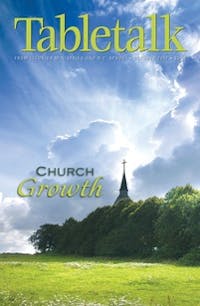
Request your free, three-month trial to Tabletalk magazine. You’ll receive the print issue monthly and gain immediate digital access to decades of archives. This trial is risk-free. No credit card required.
Try Tabletalk NowAlready receive Tabletalk magazine every month?
Verify your email address to gain unlimited access.
It goes against my own principles to argue from the perspective of the pragmatic. Pragmatism, after all, is a worldly thing. We have been called to faithfulness. God tells us what to do, and we are to do it. The results we wisely leave in His hands. Strangely, however, from time to time, the two approaches intersect. That is, sometimes doing the principled thing is the same thing as the pragmatic thing.
Consider, for a moment, this command from God: “Answer a fool according to his folly, lest he be wise in his own eyes” (Prov. 26:5). Now I grant that the verse immediately preceding this verse is puzzling: “Answer not a fool according to his folly, lest you be like him yourself.” How can we do both things? The key is this. We ought not ever to adopt the standards of fools. But we ought not to be afraid to use the standards of fools against fools. If, for instance, the promoter of the church-growth mentality holds out the size and budget of Seeker Church A as evidence of the wisdom of this approach, we would be foolish were we to respond by holding up the size and budget of Non-Seeker Church B as evidence of the folly of this approach. Everyone, no matter where they stand on this issue, if they agree that the standard is size and budget, is already a fool.
On the other hand, if God commands us to answer the pragmatist according to his pragmatism, lest he be wise in his own eyes, we, if we are principled, obey. And so I shall.
I trust that no one would really use the size and budget of a given church as a measure of effectiveness. If we did so, the largest denomination in America would not be the UMC or the SBC, but the NFL. We might, however, be tempted to measure a church’s success by the number of unbelievers it attracts. We would do this only if we were confused over the relationship between evangelism and worship. Sadly, such confusion is alive and well in the church. We do not jettison worship for the sake of evangelism, but evangelize for the sake of the worship. Nevertheless, if we agree with the fool that what we want on the Lord’s Day morning is a packed house of “seekers” what approach ought we to take? Counter-programming.
The world around us is awash in vacuity. We live in a virtual Inanity Fair. We are empty, suffering the unbearable lightness of being. The world, cutting itself off from the transcendent realm, has nothing of substance, nothing lasting to offer. If there were such a thing as a seeker, what would he be seeking? The church growth movement seems to believe he would be seeking more of the same. In a world consumed with lighthearted entertainment, we offer up less professional, less entertaining lighthearted entertainment? Why, I keep wondering, would a “seeker” get up on a Sunday morning, and travel to some giant box to hear a third rate rock band preceding a third rate comic giving a third rate “message” that leaves him in the same state that he arrived in?
If we were to design a worship service for the sake of the seeker (and remembering Proverbs 26:4, we wouldn’t want to), wouldn’t we design one that at least delivered something of what the market lacks? Shouldn’t we be filling gaps, rather than going head to head with the professionals? Wouldn’t it make sense, if you were ABC, to air Love Story while CBS is airing the Super Bowl, rather than airing a John Wayne marathon? Shouldn’t we be zigging while the whole world is zagging? A service that might attract the lost would be one that does not hide the transcendent, but reveals it. A service that might attract the lost would be one that does not deliver more of the same, but that shows forth the One. A service that might attract the lost would be one heaven bent on giving a map, rather than celebrating being lost. A service that might attract the lost would be one that panders to those who are sick of being pandered to, by refusing to pander. A service that might attract the lost would be one that offers discomfort to those who are sick and tired of being comfortable.
Of course the more we try to be pragmatic, the closer we get to the principle. If anyone is seeking, he is seeking what he has not found in the world. If anyone is seeking, he will never find, unless he seeks first the kingdom of God. We can only help them by being the kingdom of God.
Which brings us back to why we must not answer a fool according to his folly. We do not make decisions based on meeting numbers. We make decisions based on meeting God. Worship isn’t a means to an end, but the end of all means. We do not design it for the lost, nor for the found. We listen to the seeker of the lost, and do as He commands. We come to worship Him in spirit and in truth. We come to worship Him in the beauty of His holiness. We come to worship Him, for His is the kingdom, and the power, and the glory. We come to worship Him, to seek first His kingdom and His righteousness. And then, and only then, will all these things be added to us.
